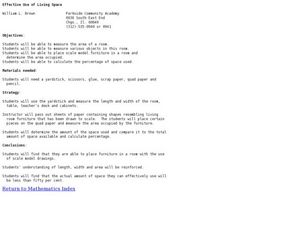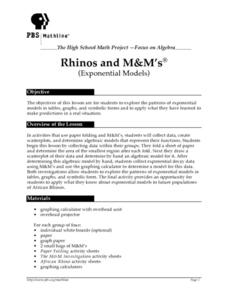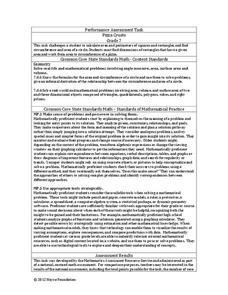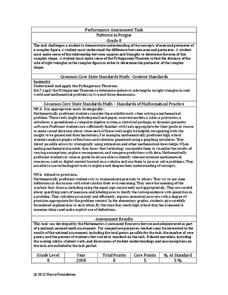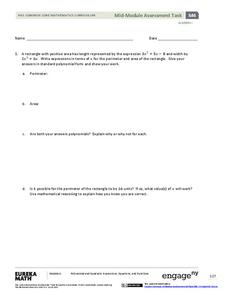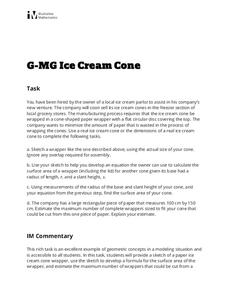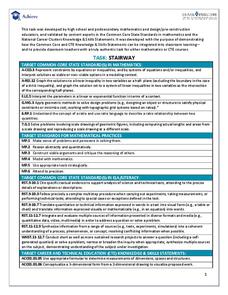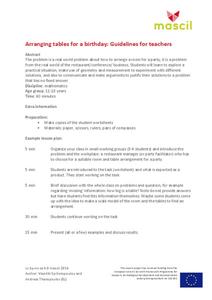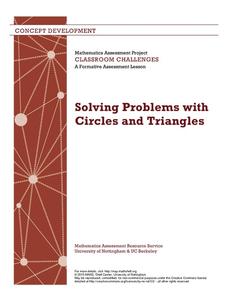Curated OER
Effective Use of Living Space
Students explore the concept of scale. In this scale lesson, students create a scale model of a room. Students calculate the area of a room. Students determine what percentage of the room is occupied by furniture.
Curated OER
Aqua-Thrusters!
Students construct their own rocket-powered boat called an "aqua-thruster." These aqua-thrusters will be made from a film canister and will use carbon dioxide gas - produced from a chemical reaction between an antacid tablet and water -...
Curated OER
Rhinos and M&M's
Students analyze patterns of exponential models by collecting data in paper folding and M&M investigations. They use graphing calculators to create scatter plots that lead to equations for the exponential models. They then apply this...
Cornell University
Atomic Bonding
Explore the connection of surface area to bonding within atoms. Learners complete lab investigations to model changing surface area with different sizes and concentrations of atoms. A flour fireball demonstration follows the labs to...
Noyce Foundation
Pizza Crusts
Enough stuffed crust to go around. Pupils calculate the area and perimeter of a variety of pizza shapes, including rectangular and circular. Individuals design rectangular pizzas with a given area to maximize the amount of crust and do...
Inside Mathematics
Expressions
Strive to think outside of the quadrilateral parallelogram. Worksheet includes two problems applying prior knowledge of area and perimeter to parallelograms and trapezoids. The focus is on finding and utilizing the proper formula and...
Inside Mathematics
Patterns in Prague
Designers in Prague are not diagonally challenged. The mini-assessment provides a complex pattern made from blocks. Individuals use the pattern to find the area and perimeter of the design. To find the perimeter, they use the Pythagorean...
Teach Engineering
Load It Up!
See how a marshmallow can hold up a bridge load. Teams take a closer look at the design of bridge piers. They determine the types of loads that might affect a bridge, and, using that information, they calculate the needed cross-sectional...
EngageNY
Mid-Module Assessment Task - Algebra 1 (module 4)
Performance task questions are the most difficult to write. Use this assessment so you don't have to! These questions assess factoring quadratics, modeling with quadratics, and key features of quadratic graphs. All questions require...
Teach Engineering
Straw Bridges
Pairs work as engineering teams to design and build model bridges from drinking straws and tape. In this third segment in a series of 10, teams compete in an attempt to build the strongest bridge. To help with the design, the groups...
Illustrative Mathematics
Ice Cream Cone
Every pupil with a sweet tooth will be clamoring for this lab and analysis, particularly when they're allowed to eat the results! Volume and surface area formulas for cones are developed from models, and then extended to the printing of...
National Nanotechnology Infrastructure Network
Wet Etching in Nanofabrication
Chemistry and physics combine forces to benefit nanofabrications. Learners examine the process of wet etching in nanofabrication. Using corrosive substances such as lemon juice and Coca-Cola, they model the etching process. They then...
Noyce Foundation
Building Blocks
Building blocks have more uses than simply entertaining children. Young mathematicians calculate the volume of a given cube, and then calculate the volume and surface area of a prism formed from multiple cubes.
Teach Engineering
Processes on Complex Networks
Introduces your class to random processes in networks with an activity that uses information about disease spread using the susceptible, infectious, resistant (SIR) model. Participants determine whether a susceptible person becomes...
Indian Institute of Technology
Could King Kong Exist?
The title says it all: Could King Kong exist? Investigate how increasing the dimensions of an object affects its surface area and volume to mathematically conclude whether a creature with the weight and height of King Kong could actually...
Big Learning
The Antarctica Project: A Middle School Mathematics Unit
Antarctica is a big place, large enough to provide ample opportunities to learn about math. A two-week unit teaches middle school mathematics concepts using project-based learning. The resource covers functions, geometry (area,...
Achieve
Stairway
It's the stairway to learning! Scholars research all aspects of building a staircase. Using information from building codes, they write and graph a system of inequalities to analyze the constraints. The completed project is a scale model...
Mathematics Assessment Project
Funsize Cans
Designing fun-size cans ... what fun! Class members use the provided questions to determine the dimensions of a can with a minimum surface area for a given volume. The task allows learners to use graphs or algebraic manipulation to...
Mascil Project
Arranging Tables for a Birthday
Planning a party of 45 guests may be more complicated than it would seem. Learners must design the space in accordance with these constraints about the space available in the room. They need to calculate area, circumference,...
Mascil Project
Circular Pave-Stones Backyard
Pack the lesson into your plans. Young mathematicians learn about packing and optimization with the context of circular paving stones. They use coins to model the paving stones, and then apply knowledge of circles and polygons to...
Mathematics Assessment Project
Solving Problems with Circles and Triangles
After completing a task involving examining the ratio of areas of triangles and circles in a given figure, scholars examine sample responses to identify other strategies they could use to solve the problem.
Virginia Department of Education
Pythagorean Theorem
Investigate the meaning of the Pythagorean Theorem through modeling. After comparing the area of the square of each side, individuals cut triangles and squares to facilitate the comparison.
Teach Engineering
Edible Rovers (High School)
Design and build a rover ... then eat it? This activity has groups of two design and build Mars rovers. The teams determine what instruments they want to include with their rover and plan a budget. They calculate the cost of the body of...
Shodor Education Foundation
Overlapping Gaussians
Adjust the overlap to compare probabilities. Using sliders, learners adjust the shape of two Gaussian curves. The interactive calculates the area of the left tail for one curve and the right tail for the other. Pupils set the interactive...
Other popular searches
- Area Model Multiplication
- Fractions Using Area Models
- Probability Area Models
- Multiplication Area Models
- Arrays and Area Models
- Binomial Area Models
- Area Model Fractions
- Area Models and Distribution
- Area Model of Multiplication
- Modelling Local Area
- Area Models Presents
- Mixed Numbers Area Model


